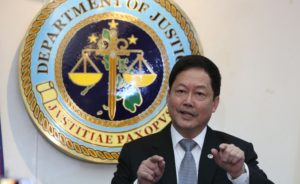MANILA, Philippines — The Philippine National Police (PNP) and the Department of the Interior and Local Government (DILG) held a dialogue on Tuesday with top executives of some universities as part of efforts to “protect campuses” against crime, drugs, and “shadowy organizations” that promote communist armed conflict.
PNP chief Gen. Oscar Albayalde said those present in the “informal and exploratory” dialogue at Camp Crame in Quezon City were Interior Secretary Eduardo Año, Commission on Higher Education Chair Prospero De Vera, University of the Philippines President Danilo Concepcion and members of the UP Board of Regents, Polytechnic University of the Philippines President Emmanuel De Guzman, and representatives from the Ateneo de Manila University and De La Salle University.
In a press briefing, Albayalde said the dialogue is a “confidence-building measure to foster a better understanding on some pressing national issues” surrounding the academe and the police.
“For our part in the security sector, the PNP seeks to build stronger collaboration among stakeholders employing the ‘whole of nation’ approach and protect campuses against criminal activities, drug syndicates, and shadowy organizations that promote and espouse local communist armed conflict against government through force and violence,” he said.
He said however that they did not specifically discuss the proposal of Sen. Ronald “Bato” Dela Rosa to allow the presence of the police and the military inside campuses to raise the awareness of students on advocacies of the government amid alleged rising recruitment of students to the New People’s Army.
Albayalde said this proposal will be discussed in succeeding dialogues with school authorities.
He said that upon agreement with school authorities, the PNP wants to engage students on ensuring public safety which are mandated duties of the police.
“We only have the best interest of the youth backing our pure good intention to establish police presence in schools against crime, exploitation and abuse,” he said.
“We assure the public and the academe community that we will do our best to fulfill our sworn duty to serve and protect,” he added.
For De Vera, the dialogue aims to “clear the air” on issues hounding the academe and the security sector, and to identify the steps that both sectors can take to address these issues.
“There are a lot of concepts that the security sector and the academic sector may define differently, so our session this afternoon is just to discuss what it means from both sides, and discussing what initiatives have been done on other areas,” he said. /je
RELATED STORY
Albayalde: Activists ‘overreacting’ on proposal to let cops inside schools


